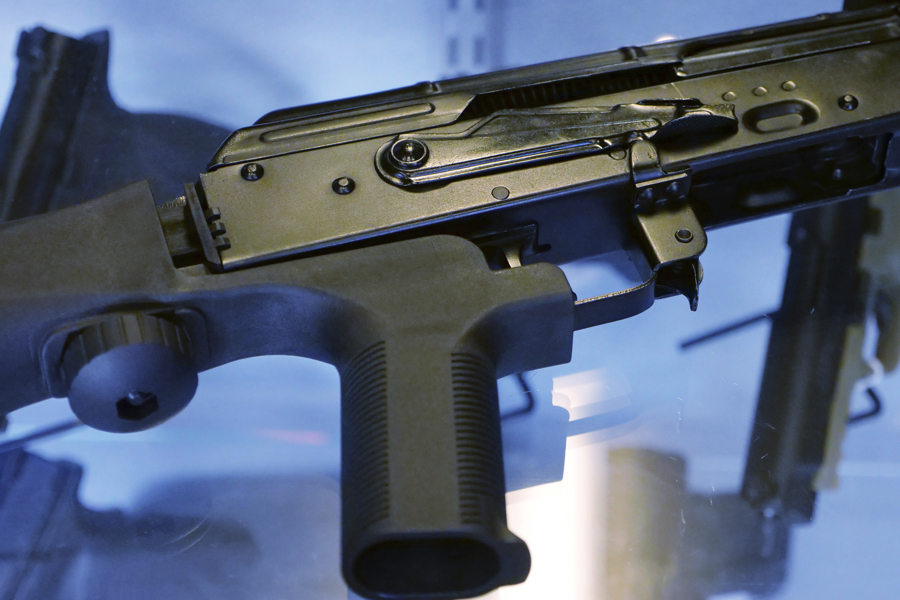Massachusetts Just Banned Bump Stocks
A first-in-the-nation law addresses a device tied to the Las Vegas shooting.

Photo via AP/Rick Bowmer
Update, 3:45 p.m.: Massachusetts Lt. Gov. Karyn Polito has signed the state budget and the bump stock ban has become law, according to the State House News Service’s Matthew Murphy. Polito is acting on behalf of Gov. Charlie Baker, who is on vacation in Palm Springs.
Earlier: In a victory for supporters of gun control in Massachusetts, a first-in-the-nation bump stock ban has been sent to the governor’s desk.
The ban is tucked into a budget bill that has passed both the House and Senate, and it would make it illegal to own one of the now-infamous devices, which augment legal guns to speed up their rate of fire. Most outside the gun hobbyist community had never heard of bump stocks before the massacre in Las Vegas, during which authorities believe the suspect used the equipment to mow down hundreds of concertgoers from his hotel room, killing 58. In videos of the attack, it sounded like machine gun fire in a war zone.
Essentially, what a bump stock does is move a semi-automatic weapon back and forth against a user’s trigger finger, causing the gun to shoot much more quickly than it would without one. A gun-owner can buy one for as little as $99 (a recent push for bans has caused demand, and their price, to skyrocket).
The ban, if signed into law, would be the first of its kind, according to Rep. David Linsky, who filed the bump stock amendment in the bill. Pre-existing laws in other states addressing gun augmentations vary, according to CBS. California law has banned “multiburst trigger activator” devices since 1990, which would include bump stocks. Massachusetts’ law would be explicit, and the first one to take effect after the massacre in October. “I am confident this language will effectively ban bump stock devices, while protecting the rights of law-abiding gun owners, and closing any loopholes that could be exploited by gun manufacturers,” Linsky said in a statement.
Last night, the Massachusetts Legislature became the first in the nation to ban bump stocks. #mapoli pic.twitter.com/EQ3HrKQEa9
— David P. Linsky (@RepDavidLinsky) November 3, 2017
The ban would take effect after 90 days, to give bump stock owners time to get rid of them. It would also ban devices called “trigger cranks.” No one—including police trainers and collectors—is exempt.
The Gun Owners Action League of Massachusetts opposes the move, citing “excessive punishment” for violators, the fact that it leaves “no pathway to legal ownership” of the devices and that it would prohibit gun owners from selling them. It has called on Gov. Charlie Baker to veto the bill. Baker has said previously that bump stocks “should be outlawed,” and said of legislation that, “if that were to pass tomorrow we would sign it.”
Calls for bump stock bans have ricocheted around the country. Even the NRA, the powerful lobbying group for gun owners and manufacturers that opposes just about any firearm restrictions, expressed some willingness to rein in the devices, although it is now opposing legislation that would do so and has said it believes that should be up to federal regulators. Legislation in Congress, which was sponsored by Massachusetts Rep. Seth Moulton, has gone nowhere. A manufacturer of bump stocks, which stopped making them after the Las Vegas massacre, has already started selling them again.
Today: 1 month since the deadliest mass shooting in our history. I intro’d a bipartisan bill. Still no debate, no vote. Just silence. pic.twitter.com/IkLSXZkXFH
— Seth Moulton (@sethmoulton) November 2, 2017
This is the latest attempt in Massachusetts to correct what advocates of stricter firearm control see as loopholes in gun laws that undermine state and federal law on the weapons. Last year, Attorney General Maura Healey launched a crackdown on what she called “copycat” assault rifles—guns that technically conform to the letter of the state’s assault weapons ban, but not the spirit. Many of those guns were sold as “state compliant” but were almost indistinguishable from the real, illegal, thing.


